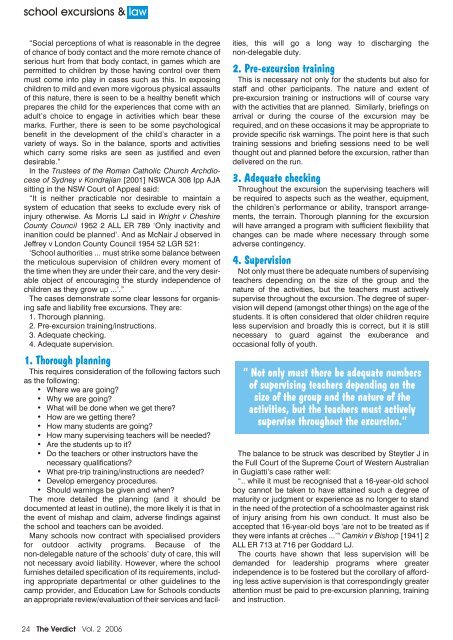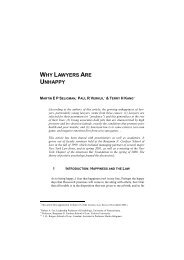By-laws - Queensland Law Society
By-laws - Queensland Law Society
By-laws - Queensland Law Society
You also want an ePaper? Increase the reach of your titles
YUMPU automatically turns print PDFs into web optimized ePapers that Google loves.
school excursions & law<br />
“Social percep tions of what is reason able in the degree<br />
of chance of body contact and the more remote chance of<br />
serious hurt from that body contact, in games which are<br />
permit ted to children by those having control over them<br />
must come into play in cases such as this. In expos ing<br />
children to mild and even more vigor ous physi cal assaults<br />
of this nature, there is seen to be a healthy benefit which<br />
prepares the child for the experi ences that come with an<br />
adult’s choice to engage in activ i ties which bear these<br />
marks. Further, there is seen to be some psycho log i cal<br />
benefit in the devel op ment of the child’s charac ter in a<br />
variety of ways. So in the balance, sports and activ i ties<br />
which carry some risks are seen as justi fied and even<br />
desirable.”<br />
In the Trust ees of the Roman Catho lic Church Archdi o -<br />
cese of Sydney v Kondrajian [2001] NSWCA 308 Ipp AJA<br />
sitting in the NSW Court of Appeal said:<br />
“It is neither practi ca ble nor desir able to maintain a<br />
system of educa tion that seeks to exclude every risk of<br />
injury other wise. As Morris LJ said in Wright v Cheshire<br />
County Council 1952 2 ALL ER 789 ‘Only inactiv ity and<br />
inani tion could be planned’. And as McNair J observed in<br />
Jeffrey v London County Council 1954 52 LGR 521:<br />
‘School author i ties ... must strike some balance between<br />
the metic u lous super vi sion of children every moment of<br />
the time when they are under their care, and the very desir -<br />
able object of encour ag ing the sturdy independ ence of<br />
children as they grow up ...’.”<br />
The cases demon strate some clear lessons for organ is -<br />
ing safe and liabil ity free excur sions. They are:<br />
1. Thorough planning.<br />
2. Pre-excur sion train ing/instruc tions.<br />
3. Adequate check ing.<br />
4. Adequate super vi sion.<br />
1. Thorough planning<br />
This requires consid er ation of the follow ing factors such<br />
as the follow ing:<br />
• Where we are going?<br />
• Why we are going?<br />
• What will be done when we get there?<br />
• How are we getting there?<br />
• How many students are going?<br />
• How many super vis ing teach ers will be needed?<br />
• Are the students up to it?<br />
• Do the teach ers or other instruc tors have the<br />
neces sary quali fi ca tions?<br />
• What pre-trip train ing/instruc tions are needed?<br />
• Develop emergency proce dures.<br />
• Should warnings be given and when?<br />
The more detailed the planning (and it should be<br />
documented at least in outline), the more likely it is that in<br />
the event of mishap and claim, adverse findings against<br />
the school and teach ers can be avoided.<br />
Many schools now contract with special ised provid ers<br />
for outdoor activ ity programs. Because of the<br />
non-delegable nature of the schools’ duty of care, this will<br />
not neces sary avoid liabil ity. However, where the school<br />
furnishes detailed speci fi ca tion of its require ments, includ -<br />
ing appro pri ate depart men tal or other guide lines to the<br />
camp provider, and Educa tion <strong>Law</strong> for Schools conducts<br />
an appro pri ate review/evalu a tion of their services and facil -<br />
24 The Verdict Vol. 2 2006<br />
i ties, this will go a long way to discharg ing the<br />
non-delegable duty.<br />
2. Pre-excur sion train ing<br />
This is neces sary not only for the students but also for<br />
staff and other partic i pants. The nature and extent of<br />
pre-excur sion train ing or instruc tions will of course vary<br />
with the activ i ties that are planned. Similarly, brief ings on<br />
arrival or during the course of the excur sion may be<br />
required, and on these occasions it may be appro pri ate to<br />
provide specific risk warnings. The point here is that such<br />
train ing sessions and brief ing sessions need to be well<br />
thought out and planned before the excur sion, rather than<br />
deliv ered on the run.<br />
3. Adequate check ing<br />
Through out the excur sion the super vis ing teach ers will<br />
be required to aspects such as the weather, equip ment,<br />
the children’s perfor mance or ability, trans port arrange -<br />
ments, the terrain. Thorough planning for the excur sion<br />
will have arranged a program with suffi cient flexi bil ity that<br />
changes can be made where neces sary through some<br />
adverse contingency.<br />
4. Super vi sion<br />
Not only must there be adequate numbers of super vis ing<br />
teach ers depend ing on the size of the group and the<br />
nature of the activ i ties, but the teach ers must actively<br />
super vise through out the excur sion. The degree of super -<br />
vi sion will depend (amongst other things) on the age of the<br />
students. It is often consid ered that older children require<br />
less super vi sion and broadly this is correct, but it is still<br />
neces sary to guard against the exuber ance and<br />
occasional folly of youth.<br />
“ Not only must there be adequate numbers<br />
of super vis ing teach ers depend ing on the<br />
size of the group and the nature of the<br />
activ i ties, but the teach ers must actively<br />
super vise through out the excur sion.”<br />
The balance to be struck was described by Steytler J in<br />
the Full Court of the Supreme Court of Western Austra lian<br />
in Gugiatti’s case rather well:<br />
“.. while it must be recog nised that a 16-year-old school<br />
boy cannot be taken to have attained such a degree of<br />
maturity or judgment or experi ence as no longer to stand<br />
in the need of the protec tion of a school mas ter against risk<br />
of injury arising from his own conduct. It must also be<br />
accepted that 16-year-old boys ‘are not to be treated as if<br />
they were infants at crèches ...’” Camkin v Bishop [1941] 2<br />
ALL ER 713 at 716 per Goddard LJ.<br />
The courts have shown that less super vi sion will be<br />
demanded for leader ship programs where greater<br />
independ ence is to be fostered but the corol lary of afford -<br />
ing less active super vi sion is that corre spond ingly greater<br />
atten tion must be paid to pre-excur sion planning, train ing<br />
and instruc tion.



